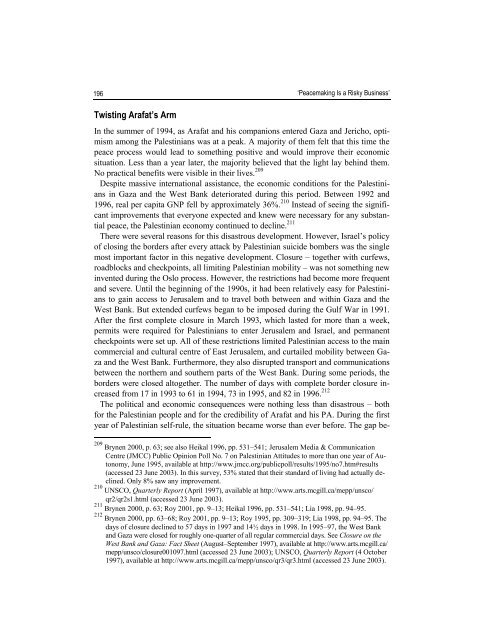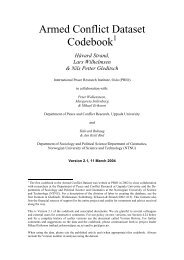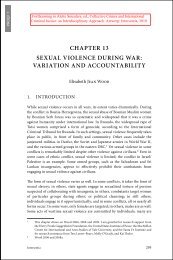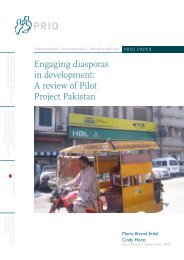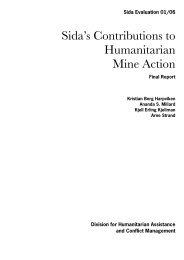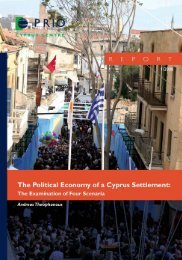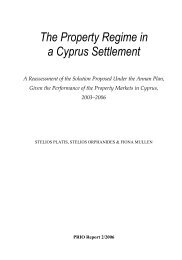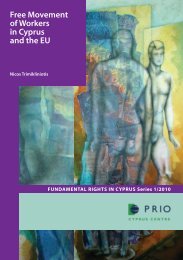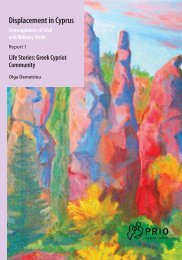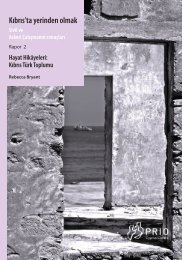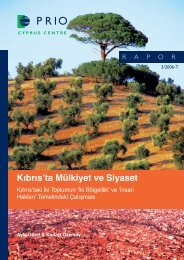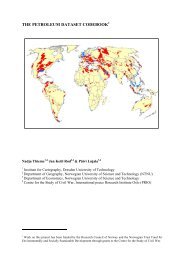Peacemaking Is a Risky Business - PRIO
Peacemaking Is a Risky Business - PRIO
Peacemaking Is a Risky Business - PRIO
You also want an ePaper? Increase the reach of your titles
YUMPU automatically turns print PDFs into web optimized ePapers that Google loves.
196 ‘<strong>Peacemaking</strong> <strong>Is</strong> a <strong>Risky</strong> <strong>Business</strong>’Twisting Arafat’s ArmIn the summer of 1994, as Arafat and his companions entered Gaza and Jericho, optimismamong the Palestinians was at a peak. A majority of them felt that this time thepeace process would lead to something positive and would improve their economicsituation. Less than a year later, the majority believed that the light lay behind them.No practical benefits were visible in their lives. 209Despite massive international assistance, the economic conditions for the Palestiniansin Gaza and the West Bank deteriorated during this period. Between 1992 and1996, real per capita GNP fell by approximately 36%. 210 Instead of seeing the significantimprovements that everyone expected and knew were necessary for any substantialpeace, the Palestinian economy continued to decline. 211There were several reasons for this disastrous development. However, <strong>Is</strong>rael’s policyof closing the borders after every attack by Palestinian suicide bombers was the singlemost important factor in this negative development. Closure – together with curfews,roadblocks and checkpoints, all limiting Palestinian mobility – was not something newinvented during the Oslo process. However, the restrictions had become more frequentand severe. Until the beginning of the 1990s, it had been relatively easy for Palestiniansto gain access to Jerusalem and to travel both between and within Gaza and theWest Bank. But extended curfews began to be imposed during the Gulf War in 1991.After the first complete closure in March 1993, which lasted for more than a week,permits were required for Palestinians to enter Jerusalem and <strong>Is</strong>rael, and permanentcheckpoints were set up. All of these restrictions limited Palestinian access to the maincommercial and cultural centre of East Jerusalem, and curtailed mobility between Gazaand the West Bank. Furthermore, they also disrupted transport and communicationsbetween the northern and southern parts of the West Bank. During some periods, theborders were closed altogether. The number of days with complete border closure increasedfrom 17 in 1993 to 61 in 1994, 73 in 1995, and 82 in 1996. 212The political and economic consequences were nothing less than disastrous – bothfor the Palestinian people and for the credibility of Arafat and his PA. During the firstyear of Palestinian self-rule, the situation became worse than ever before. The gap be-209 Brynen 2000, p. 63; see also Heikal 1996, pp. 531–541; Jerusalem Media & CommunicationCentre (JMCC) Public Opinion Poll No. 7 on Palestinian Attitudes to more than one year of Autonomy,June 1995, available at http://www.jmcc.org/publicpoll/results/1995/no7.htm#results(accessed 23 June 2003). In this survey, 53% stated that their standard of living had actually declined.Only 8% saw any improvement.210 UNSCO, Quarterly Report (April 1997), available at http://www.arts.mcgill.ca/mepp/unsco/qr2/qr2s1.html (accessed 23 June 2003).211 Brynen 2000, p. 63; Roy 2001, pp. 9–13; Heikal 1996, pp. 531–541; Lia 1998, pp. 94–95.212 Brynen 2000, pp. 63–68; Roy 2001, pp. 9–13; Roy 1995, pp. 309–319; Lia 1998, pp. 94–95. Thedays of closure declined to 57 days in 1997 and 14½ days in 1998. In 1995–97, the West Bankand Gaza were closed for roughly one-quarter of all regular commercial days. See Closure on theWest Bank and Gaza: Fact Sheet (August–September 1997), available at http://www.arts.mcgill.ca/mepp/unsco/closure001097.html (accessed 23 June 2003); UNSCO, Quarterly Report (4 October1997), available at http://www.arts.mcgill.ca/mepp/unsco/qr3/qr3.html (accessed 23 June 2003).


